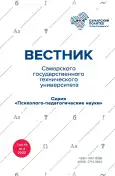The concept of the “pedagogical event” in educational discourse
- Authors: Dobrova V.V.1
-
Affiliations:
- Самарский государственный технический университет
- Issue: Vol 19, No 4 (2022)
- Pages: 47-56
- Section: Theory of pedagogy
- URL: https://bakhtiniada.ru/1991-8569/article/view/255350
- DOI: https://doi.org/10.17673/vsgtu-pps.2022.4.4
- ID: 255350
Cite item
Full Text
Abstract
Clarification of conceptual and terminological apparatus is an urgent task of modern pedagogy, in this connection the paper deals with the concept of “pedagogical event”, as well as its relationship with the main pedagogical categories: education, training and upbringing. Based on the research conducted within the social and human sciences, the integral features of the “event”, such as the significance of changes in the life of the subject and spatial and temporal characteristics were identified, which allowed to define the “pedagogical event” in an interdisciplinary dynamic aspect. One of the main functions of education in the modern world is the transmission of culture from one generation to another, reproduction and development of culture. If the aim of education is understood as the transmission, reproduction and generation of culture, the “pedagogical event” can be defined as a change through adaptation of cultural experience of humanity to the cultural experience of the student, i.e. translation of culture from one person to another.
Keywords
Full Text
##article.viewOnOriginalSite##About the authors
Victoria V. Dobrova
Самарский государственный технический университет
Author for correspondence.
Email: victoria_dob@mail.ru
Cand. Psych. Sci., Associate professor, Head of the Foreign Languages Department
Russian Federation, СамараReferences
- Kraevskii VV. Metodologiya pedagogiki: posobie dlya pedagogov-issledovatelei. Cheboksary: Izd-vo CHGU, 2006. 244 p. (In Russ.)
- Likhachev BT. Pedagogika. Kurs lektsii. 4-e izd., pererab. i dop. Moscow: Yurait-M, 2010. 607 p. (In Russ.)
- Nechaeva AM. Once again about terms. State and law. 2016;(5):92–95. (In Russ.)
- Dobrova VV. Pedagogical situations: interpretation difference. Vestnik of Samara State Technical University Psychological and Pedagogical Sciences. 2021;18(4):73–82. (In Russ.) doi: 10.17673/vsgtu-pps.2021.4.6
- Zagvyazinskii VI, Emel’yanova IN. Obshchaya pedagogika: uchebnoe posobie. Moscow: Vysshaya shkola, 2008. 391 p. (In Russ.)
- Lukatsky MA. Horizons of the formation of pedagogical semiology. Otechestvennaya i zarubezhnaya pedagogika. 2015;(5):139–149. (In Russ.)
- Ozhegov SI, Shvedova NYu. Tolkovyi slovar’ russkogo yazyka: 80 000 slov i frazeologicheskikh vyrazhenii. Moscow: Azbukovnik, 1999. 944 p. (In Russ.)
- Stepanova MA. Sobytiinye imena i ikh rol’ v organizatsii diskursa (na materiale angliiskogo yazyka) [dissertation]. Barnaul, 2003. 184 p. (In Russ.)
- Arutyunova ND. Yazyk i mir cheloveka. Moscow: Yazyk russkoi kul’tury, 2022. 895 p. (In Russ.)
- Vendler Z. Prichinnye otnosheniya. NZL. Moscow: Progress. 1986;(XVIII: Logicheskii analiz estestvennogo yazyka):264–276. (In Russ.)
- Rassel B. Chelovecheskoe poznanie. Moscow: Institut obshchegumanitarnykh issledovanii, 1957. 555 p. (In Russ.)
- Ivin AA, editor. Filosofiya: ehntsiklopedicheskii slovar’. Moscow: Gardariki, 2004. 1072 p. (In Russ.)
- Eremenko AM. Іstorichna podіya v kontekstі єvropeis’koї traditsії (sotsіal’no-fіlosofs’kii analіz) [dissertation abstract]. Dnipropetrovsk, 2010. (In Ucrain.)
- Drozd KV, Plaksina IV. Proektirovanie obrazovatel’noi sredy: uchebnoe posobie dlya vuzov. Moscow: Yurait, 2022. 437 p. (In Russ.)
- Popova RR. The problem of definition of the concept «event» in psychology. Vestnik TGGPU. Seriya psikhologo-pedagogicheskie nauki: psikhologiya. 2011;(3):287–293. (In Russ.)
- Gubskii EF, Korableva GV, Lutchenko VA, editors. Filosofskii ehntsiklopedicheskii slovar’. Moscow: Infra-M, 2003. 576 p. (In Russ.)
- Ishmuratov AT. Logicheskii analiz prakticheskikh rassuzhdenii (formalizatsiya psikhologicheskikh ponyatii). Kyiv: Naukova Dumka, 1987. 141 p. (In Russ.)
- Barwise J, Perry M. Situations and Attitudes. Cambridge (Mass.): MIT Press, 1983. P. 264–265.
- Bakhtin MM. Ehpos i roman (o metodologii issledovaniya romana). Saint Petersburg: Azbuka, 2000. P. 11–193; p. 298. (In Russ.)
- Ukhtomskii AA. Dominanta: fiziologiya povedeniya. Saint Petersburg: AST, 2020. 320 p. (In Russ.)
- Rudnev VP. Filosofiya yazyka i semiotika bezumiya. Izbrannye raboty. Moscow: ID Territoriya budushchego, 2007. 528 p. (In Russ.)
- Khomyakova EG. Approaches to the linguistic analysis of the event situation. The Scientific Opinion. 2015;(9-1):138–141. (In Russ.)
- Anan’ev BG. Izbrannye psikhologicheskie trudy v 2-kh t. T. 1. Moscow: Pedagogika, 1980. 232 p. (In Russ.)
- Lobanov VV. Educational event as the pedagogical category. The Education and science journal. 2015;1(1):33–42. (In Russ.) doi: 10.17853/1994-5639-2015-1-33-42
- Grigor’ev DV. Sozdanie vospitatel’nogo prostranstva: sobytiinyi podkhod. Sovremennye gumanitarnye podkhody v teorii i praktike vospitaniya. Perm, 2001. P. 77–88. (In Russ.)
- Golovanova NF. Obshchaya pedagogika. Saint Petersburg: Rech’, 2005. 317 p. (In Russ.)
- Lyz’ NA. K voprosu o funktsiyakh i tseli obrazovaniya. Izvestiya TRTU. 2005;(5):6–10. (In Russ.)
- Logvinov IN, Sarychev SV, Silakov AS. Pedagogicheskaya psikhologiya v skhemakh i kommentariyakh: uchebnoe posobie dlya vuzov. Moscow: Yurait, 2022. 171 p. (In Russ.)
- Lerner IYa. Protsess obucheniya i ego zakonomernosti. Moscow: Znanie, 1980. 96 p. (In Russ.)
- Kornetov GB. Pedagogicheskie paradigmy bazovykh modelei obrazovaniya. Moscow: URAO, 2001. 124 p. (In Russ.)
- Simonenko VD, Retivykh MV. Obshchaya i professional’naya pedagogika. Bryansk: Izd-vo BGU, 2003. 174 p. (In Russ.)
- Lukatskii MA. Chelovek obuchayushchiisya (homo educandus): ot antichnosti do sovremennosti. New in psychological and pedagogical research. 2008;(1):6–35. (In Russ.)
- Solovtsova IA, Borytko HM. Gumanitarnaya pedogogika. Vyp. 3: «Obshchie osnovy pedagogiki». Volgograd: VGSPU, 2006. (In Russ.)
- Kodzhaspirova GM. Pedagogicheskaya antropologiya: uchebnik i praktikum dlya vuzov. Moscow: Yurait, 2022. 360 p. (In Russ.)
Supplementary files







